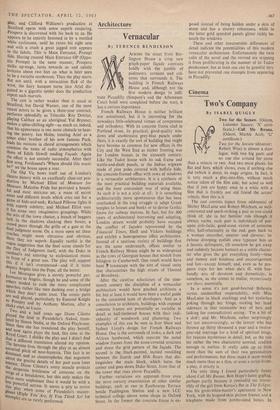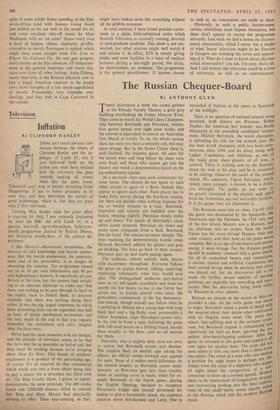Cinema
Two's Company
By ISABEL QUIGLY
Two for the Seesaw (director: Robert Wise) is almost a duo- logue, with two big parts and no one else around for more than a minute or two. And two main places, his flat and hers, which shows, even if nothing else did (which it does), its stagy origins. In fact, it is very much a play-into-film, without much notice taken of the film side; but acted so well that if you are happy once in a while with a film that is frankly our old friend the actors' vehicle, then this is it.
The cast consists (apart from oddments) of Shirley MacLaine and Robert Mitchum, as well- contrasted and spark-striking a pair as you could think of; she in her familiar role (though it always varies, each part is individual) of put- upon jolie-laide, good-scout victim of someone who, half-reluctantly in the end, goes back to a woman smoother, smarter and cleverer; he (whose drooping eyelids once typecast him as a laconic delinquent, till somehow he got away and suddenly became human) as a subtle charac- ter who gives the girl everything freely—time and money and kindness and encouragement and fun—except himself, and, even as he pre- pares trays for her when she's ill, with hus- bandly airs of devotion and domesticity, is somehow, as she comes to realise, mysteriously not there, essentially.
In a sense it's just good-hearted Bohemia versus unidentified respectability, with Miss MacLaine in black stockings and her eyelashes poking through her fringe, tucking her head sideways in that inimitable • way of hers and (asking for contradiction) saying: 'I'm a bit of a slob'; and Mr. Mitchum, rather surprisingly but not unconvincingly, as the lawyer who has thrown up thirty thousand a year and a twelve- year-old marriage for a kind of spiritual binge, for reasons mysterious in detail, but, as the tale (or rather the two characters) unwind, credible enough in outline. It really adds up to little more than the sum of their two personalities and performances, but these make it seem worth much more than as a film, or even a script-from- a-play, it strictly is.
The only thing I found particularly funny about Call Me ilwatta, Bob Hope's latest gagbag, perhaps partly because it reminded me irresis- tibly of the girl from Kenya's flat in The Eclipse, was his great-white-hunter's apartment in New York, with its leopard-skin picture frames and a telephone made from jumbo-sized bones. In spite of some mildly funny spoofing of the film- set-in-Africa (and with Sammy Going South just behind us we are well in the mood for it), and some excellent take-off music by Muir Matheson, with an 'on safari' theme every time a herd of hippos, rhinos, elephants, giraffes, crocodiles or merely flamingoes is sighted, which might have come straight from The Lion or Where No Vultures Fly, the rest gets progres- sively feebler as the film advances, till embarrass- ment at the general ineptness, and much else, takes over from all other feelings. Anita Ekberg, vaster than ever, is the Russian physicist sent to lure a bogus American explorer in the jungle away from thoughts of a lost moon-capsuleload of secrets. Foreseeably, love triumphs over ideology, and they bolt to Cape Canaveral in the capsule.



































 Previous page
Previous page